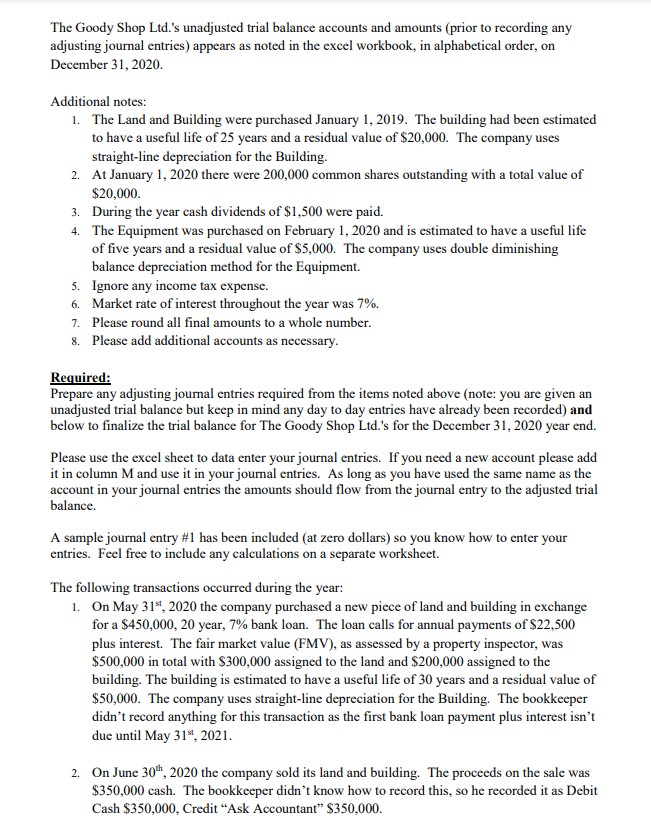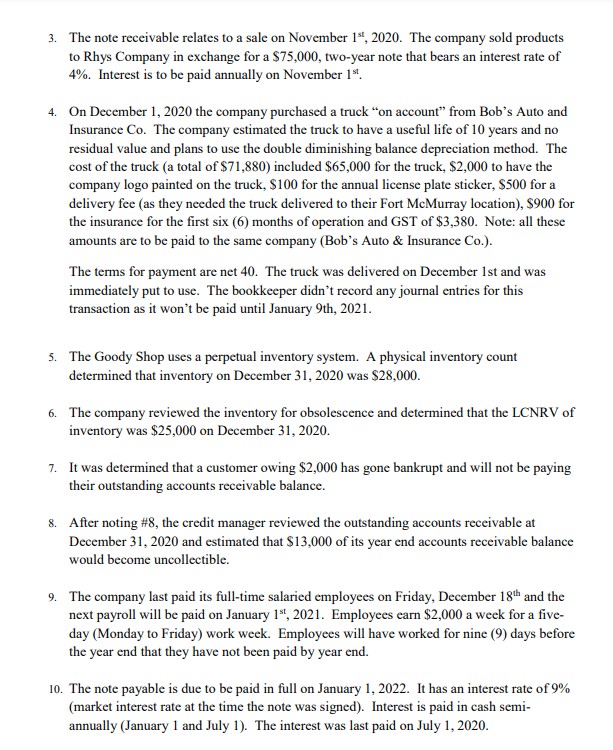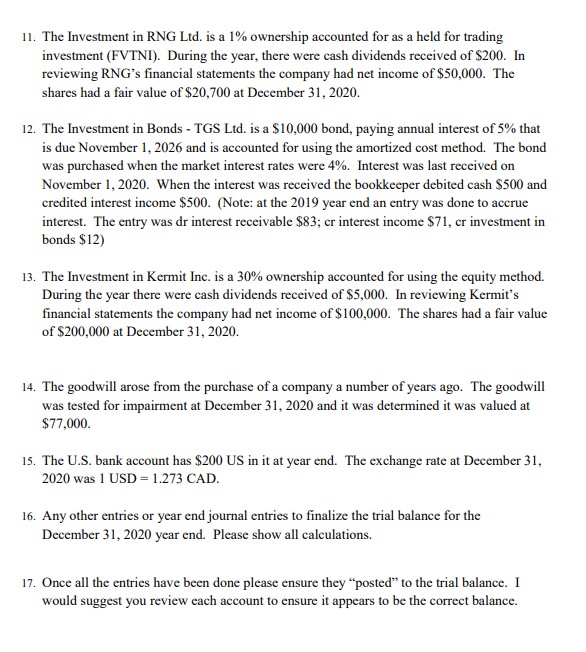

 What would be the adjusting entries for 1-17?
What would be the adjusting entries for 1-17?
The Goody Shop Ltd.'s unadjusted trial balance accounts and amounts (prior to recording any adjusting journal entries) appears as noted in the excel workbook, in alphabetical order, on December 31,2020. Additional notes: 1. The Land and Building were purchased January 1, 2019. The building had been estimated to have a useful life of 25 years and a residual value of $20,000. The company uses straight-line depreciation for the Building. 2. At January 1, 2020 there were 200,000 common shares outstanding with a total value of $20,000. 3. During the year cash dividends of $1,500 were paid. 4. The Equipment was purchased on February 1, 2020 and is estimated to have a useful life of five years and a residual value of $5,000. The company uses double diminishing balance depreciation method for the Equipment. 5. Ignore any income tax expense. 6. Market rate of interest throughout the year was 7%. 7. Please round all final amounts to a whole number. 8. Please add additional accounts as necessary. Required: Prepare any adjusting journal entries required from the items noted above (note: you are given an unadjusted trial balance but keep in mind any day to day entries have already been recorded) and below to finalize the trial balance for The Goody Shop Ltd.'s for the December 31, 2020 year end. Please use the excel sheet to data enter your journal entries. If you need a new account please add it in column M and use it in your journal entries. As long as you have used the same name as the account in your journal entries the amounts should flow from the journal entry to the adjusted trial balance. A sample journal entry \#1 has been included (at zero dollars) so you know how to enter your entries. Feel free to include any calculations on a separate worksheet. The following transactions occurred during the year: 1. On May 31st,2020 the company purchased a new piece of land and building in exchange for a $450,000,20 year, 7% bank loan. The loan calls for annual payments of $22,500 plus interest. The fair market value (FMV), as assessed by a property inspector, was $500,000 in total with $300,000 assigned to the land and $200,000 assigned to the building. The building is estimated to have a useful life of 30 years and a residual value of $50,000. The company uses straight-line depreciation for the Building. The bookkeeper didn't record anything for this transaction as the first bank loan payment plus interest isn't due until May 31st,2021. 2. On June 30th,2020 the company sold its land and building. The proceeds on the sale was $350,000 cash. The bookkeeper didn't know how to record this, so he recorded it as Debit Cash $350,000, Credit "Ask Accountant" $350,000. 3. The note receivable relates to a sale on November 1st,2020. The company sold products to Rhys Company in exchange for a $75,000, two-year note that bears an interest rate of 4%. Interest is to be paid annually on November 1st. 4. On December 1, 2020 the company purchased a truck "on account" from Bob's Auto and Insurance Co. The company estimated the truck to have a useful life of 10 years and no residual value and plans to use the double diminishing balance depreciation method. The cost of the truck (a total of $71,880 ) included $65,000 for the truck, $2,000 to have the company logo painted on the truck, $100 for the annual license plate sticker, $500 for a delivery fee (as they needed the truck delivered to their Fort McMurray location), $900 for the insurance for the first six(6) months of operation and GST of $3,380. Note: all these amounts are to be paid to the same company (Bob's Auto \& Insurance Co.). The terms for payment are net 40 . The truck was delivered on December 1 st and was immediately put to use. The bookkeeper didn't record any journal entries for this transaction as it won't be paid until January 9th, 2021. 5. The Goody Shop uses a perpetual inventory system. A physical inventory count determined that inventory on December 31,2020 was $28,000. 6. The company reviewed the inventory for obsolescence and determined that the LCNRV of inventory was $25,000 on December 31,2020. 7. It was determined that a customer owing $2,000 has gone bankrupt and will not be paying their outstanding accounts receivable balance. 8. After noting \#8, the credit manager reviewed the outstanding accounts receivable at December 31,2020 and estimated that $13,000 of its year end accounts receivable balance would become uncollectible. 9. The company last paid its full-time salaried employees on Friday, December 18th and the next payroll will be paid on January 1st,2021. Employees earn $2,000 a week for a fiveday (Monday to Friday) work week. Employees will have worked for nine (9) days before the year end that they have not been paid by year end. 10. The note payable is due to be paid in full on January 1,2022 . It has an interest rate of 9% (market interest rate at the time the note was signed). Interest is paid in cash semiannually (January 1 and July 1). The interest was last paid on July 1, 2020. 11. The Investment in RNG Ltd. is a 1% ownership accounted for as a held for trading investment (FVTNI). During the year, there were cash dividends received of $200. In reviewing RNG's financial statements the company had net income of $50,000. The shares had a fair value of $20,700 at December 31,2020. 12. The Investment in Bonds - TGS Ltd. is a $10,000 bond, paying annual interest of 5% that is due November 1, 2026 and is accounted for using the amortized cost method. The bond was purchased when the market interest rates were 4%. Interest was last received on November 1, 2020. When the interest was received the bookkeeper debited cash $500 and credited interest income $500. (Note: at the 2019 year end an entry was done to accrue interest. The entry was dr interest receivable $83; cr interest income $71, cr investment in bonds $12 ) 13. The Investment in Kermit Inc. is a 30% ownership accounted for using the equity method. During the year there were cash dividends received of $5,000. In reviewing Kermit's financial statements the company had net income of $100,000. The shares had a fair value of $200,000 at December 31, 2020. 14. The goodwill arose from the purchase of a company a number of years ago. The goodwill was tested for impairment at December 31, 2020 and it was determined it was valued at $77,000. 15. The U.S. bank account has $200 US in it at year end. The exchange rate at December 31 , 2020 was 1 USD =1.273 CAD. 16. Any other entries or year end journal entries to finalize the trial balance for the December 31, 2020 year end. Please show all calculations. 17. Once all the entries have been done please ensure they "posted" to the trial balance. I would suggest you review each account to ensure it appears to be the correct balance. The Goody Shop Ltd.'s unadjusted trial balance accounts and amounts (prior to recording any adjusting journal entries) appears as noted in the excel workbook, in alphabetical order, on December 31,2020. Additional notes: 1. The Land and Building were purchased January 1, 2019. The building had been estimated to have a useful life of 25 years and a residual value of $20,000. The company uses straight-line depreciation for the Building. 2. At January 1, 2020 there were 200,000 common shares outstanding with a total value of $20,000. 3. During the year cash dividends of $1,500 were paid. 4. The Equipment was purchased on February 1, 2020 and is estimated to have a useful life of five years and a residual value of $5,000. The company uses double diminishing balance depreciation method for the Equipment. 5. Ignore any income tax expense. 6. Market rate of interest throughout the year was 7%. 7. Please round all final amounts to a whole number. 8. Please add additional accounts as necessary. Required: Prepare any adjusting journal entries required from the items noted above (note: you are given an unadjusted trial balance but keep in mind any day to day entries have already been recorded) and below to finalize the trial balance for The Goody Shop Ltd.'s for the December 31, 2020 year end. Please use the excel sheet to data enter your journal entries. If you need a new account please add it in column M and use it in your journal entries. As long as you have used the same name as the account in your journal entries the amounts should flow from the journal entry to the adjusted trial balance. A sample journal entry \#1 has been included (at zero dollars) so you know how to enter your entries. Feel free to include any calculations on a separate worksheet. The following transactions occurred during the year: 1. On May 31st,2020 the company purchased a new piece of land and building in exchange for a $450,000,20 year, 7% bank loan. The loan calls for annual payments of $22,500 plus interest. The fair market value (FMV), as assessed by a property inspector, was $500,000 in total with $300,000 assigned to the land and $200,000 assigned to the building. The building is estimated to have a useful life of 30 years and a residual value of $50,000. The company uses straight-line depreciation for the Building. The bookkeeper didn't record anything for this transaction as the first bank loan payment plus interest isn't due until May 31st,2021. 2. On June 30th,2020 the company sold its land and building. The proceeds on the sale was $350,000 cash. The bookkeeper didn't know how to record this, so he recorded it as Debit Cash $350,000, Credit "Ask Accountant" $350,000. 3. The note receivable relates to a sale on November 1st,2020. The company sold products to Rhys Company in exchange for a $75,000, two-year note that bears an interest rate of 4%. Interest is to be paid annually on November 1st. 4. On December 1, 2020 the company purchased a truck "on account" from Bob's Auto and Insurance Co. The company estimated the truck to have a useful life of 10 years and no residual value and plans to use the double diminishing balance depreciation method. The cost of the truck (a total of $71,880 ) included $65,000 for the truck, $2,000 to have the company logo painted on the truck, $100 for the annual license plate sticker, $500 for a delivery fee (as they needed the truck delivered to their Fort McMurray location), $900 for the insurance for the first six(6) months of operation and GST of $3,380. Note: all these amounts are to be paid to the same company (Bob's Auto \& Insurance Co.). The terms for payment are net 40 . The truck was delivered on December 1 st and was immediately put to use. The bookkeeper didn't record any journal entries for this transaction as it won't be paid until January 9th, 2021. 5. The Goody Shop uses a perpetual inventory system. A physical inventory count determined that inventory on December 31,2020 was $28,000. 6. The company reviewed the inventory for obsolescence and determined that the LCNRV of inventory was $25,000 on December 31,2020. 7. It was determined that a customer owing $2,000 has gone bankrupt and will not be paying their outstanding accounts receivable balance. 8. After noting \#8, the credit manager reviewed the outstanding accounts receivable at December 31,2020 and estimated that $13,000 of its year end accounts receivable balance would become uncollectible. 9. The company last paid its full-time salaried employees on Friday, December 18th and the next payroll will be paid on January 1st,2021. Employees earn $2,000 a week for a fiveday (Monday to Friday) work week. Employees will have worked for nine (9) days before the year end that they have not been paid by year end. 10. The note payable is due to be paid in full on January 1,2022 . It has an interest rate of 9% (market interest rate at the time the note was signed). Interest is paid in cash semiannually (January 1 and July 1). The interest was last paid on July 1, 2020. 11. The Investment in RNG Ltd. is a 1% ownership accounted for as a held for trading investment (FVTNI). During the year, there were cash dividends received of $200. In reviewing RNG's financial statements the company had net income of $50,000. The shares had a fair value of $20,700 at December 31,2020. 12. The Investment in Bonds - TGS Ltd. is a $10,000 bond, paying annual interest of 5% that is due November 1, 2026 and is accounted for using the amortized cost method. The bond was purchased when the market interest rates were 4%. Interest was last received on November 1, 2020. When the interest was received the bookkeeper debited cash $500 and credited interest income $500. (Note: at the 2019 year end an entry was done to accrue interest. The entry was dr interest receivable $83; cr interest income $71, cr investment in bonds $12 ) 13. The Investment in Kermit Inc. is a 30% ownership accounted for using the equity method. During the year there were cash dividends received of $5,000. In reviewing Kermit's financial statements the company had net income of $100,000. The shares had a fair value of $200,000 at December 31, 2020. 14. The goodwill arose from the purchase of a company a number of years ago. The goodwill was tested for impairment at December 31, 2020 and it was determined it was valued at $77,000. 15. The U.S. bank account has $200 US in it at year end. The exchange rate at December 31 , 2020 was 1 USD =1.273 CAD. 16. Any other entries or year end journal entries to finalize the trial balance for the December 31, 2020 year end. Please show all calculations. 17. Once all the entries have been done please ensure they "posted" to the trial balance. I would suggest you review each account to ensure it appears to be the correct balance


 What would be the adjusting entries for 1-17?
What would be the adjusting entries for 1-17?





